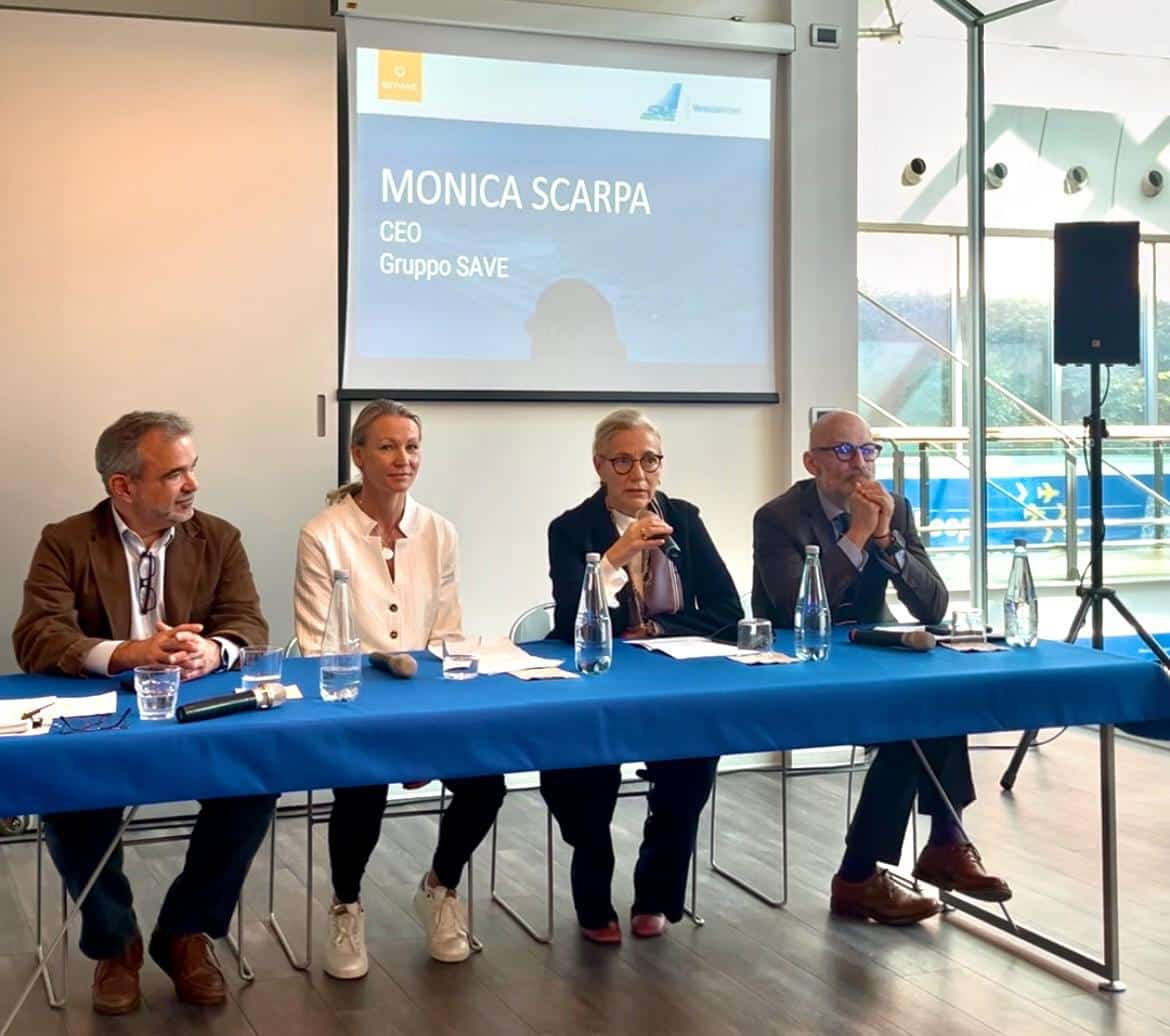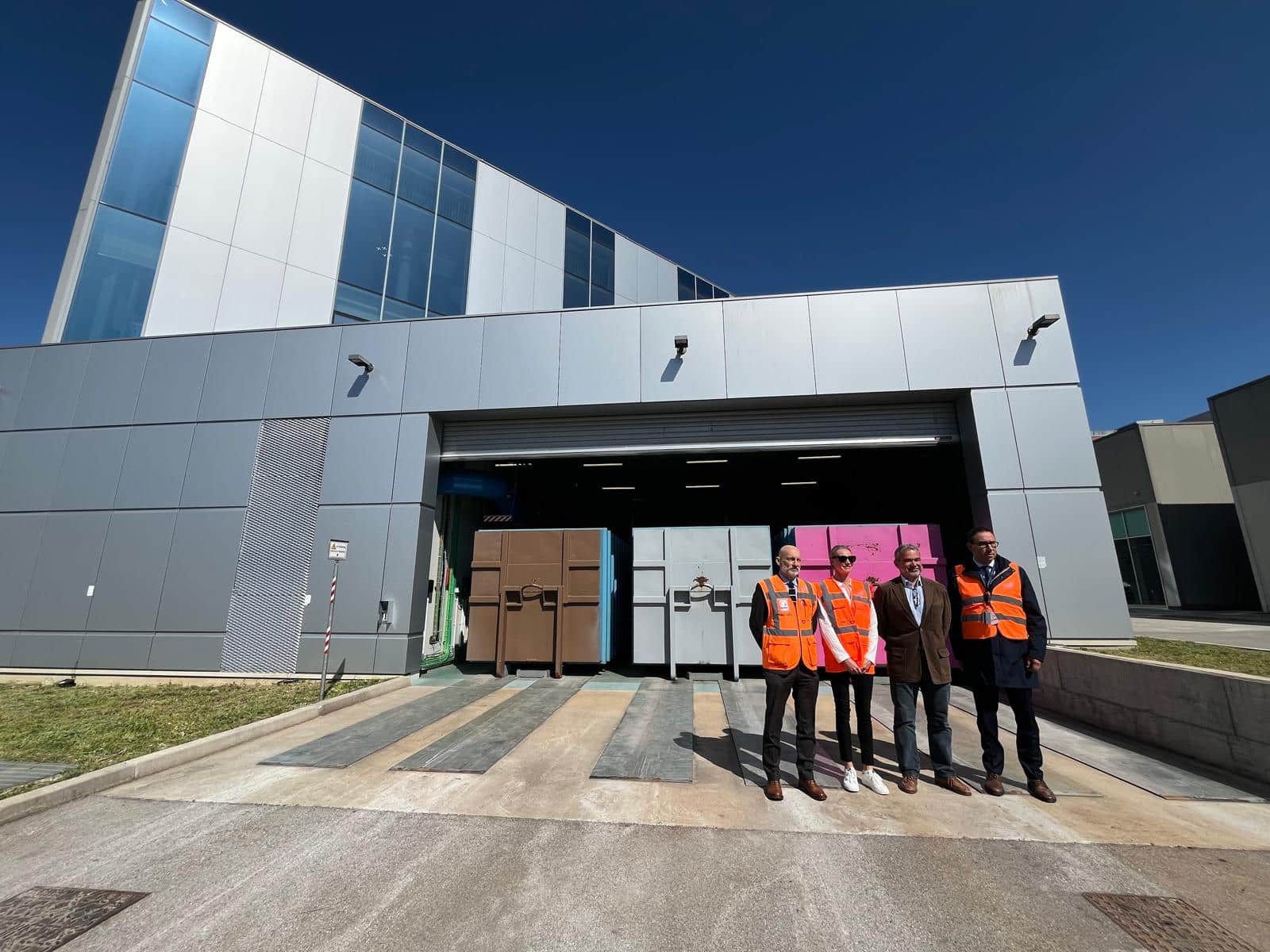
Max Mutti, Country Manager Envac EMEA; Sara Arrhenius, CMO Envac Group; Monica Scarpa, CEO Gruppo Save; Davide Bassano, director sostenibilidad Gruppo Save.
Venice, Italy 02nd April 2025
- Marco Polo is the second airport in Europe to equip itself with a waste collection system based on advanced technology that promotes the circular economy.
- Envac returns to the airport sector stronger and more technologically advanced than ever after a few years of focusing on residential projects that have allowed the group to explore new ways to optimise its R&D and services.
The SAVE Group’s commitment to sustainability and the achievement of the ‘zero emissions’ target by 2030 takes another important step forward with the new and innovative system presented today, together with Envac, with several airport systems installed in Europe.
The second airport in Europe after Oslo-Gardemoen, Marco Polo, has equipped itself with a state-of-the-art pneumatic waste collection system that serves the south side of the passenger terminal, which will be progressively implemented throughout the entire terminal.
The pneumatic system by Envac consists of an initial network of over 500 metres of underground pipes through which the waste is transported from the source, with inlets spread inside the terminal, to the waste collection station installed on the ground floor. Waste is collected, already separated, and conveyed into three hermetically sealed containers divided into residual, multi-material packaging (plastic, glass, and cans) and organic waste (paper is handled with a different, dedicated procedure). From here, the waste is picked up periodically by VERITAS for transport to the recovery and treatment centres.
The total investment for the system by SAVE was EUR 2.1 million.

Davide Bassano, director sostenibilidad Gruppo Save, Sara Arrhenius, CMO Envac Group, Max Mutti, Country Manager Envac EMEA, Radames Favaro, supervisor técnico dirección sostenibilidad Gruppo Save
The most positive effects in terms of sustainability of the system, which operates 24 hours a day, every day of the week, can be summarised as follows:
- The separation of different types of waste takes place more efficiently.
- The automated management of the collection and storage process eliminates errors and mixing of waste; the system now handles 33% of the total waste generated by the airport’s operations.
- Collection directly from containers located at the waste collection station has allowed the elimination of the use of multiple vehicles for the transfer of waste to the ecological island at the airport, with a projected saving of about 6 tonnes of CO2 in one year.
- Centralised collection eliminates all intermediate waste collection depots at the airport.
- Pneumatic collection results in minimal waste handling, thus, significantly better and more ergonomic working conditions for operators.
The positive experience and the goal of achieving ‘Zero Waste’ led SAVE to plan in its Master Plan for 2037 the extension of the pneumatic system network to all major airport buildings for a final total of 6.5 kilometres of piping.
”The path undertaken by our airport to achieve zero emissions by 2030 is proceeding with concrete actions, which apply the most modern technologies to different environmental contexts, from energy management to water and waste management. The tyre system is an important step in this roadmap included in the Master Plan 2037, which envisages the gradual extension of this system to the entire airport, for an investment of an additional EUR 52 million, which is part of the total investment in environmental sustainability of around EUR 378 million. Our attention is particularly focused on the circular economy, with projects that promote its applicability, among which, in addition to the system presented this morning, is the latest-generation water purifier, which already allows a 30% saving in drinking water and will be further implemented in the coming years.” – Monica Scarpa, CEO of the SAVE Group
”We are very proud to be part of this plan and to see how Envac systems continue to help redefine the way in which waste is managed in an increasingly humane and environmentally conscious and sustainable environment. With the launch of the Venice Marco Polo airport system, Envac returns to the airport sector stronger and more technologically advanced than ever after a few years focused on residential projects that have allowed it to explore new ways to optimise its R&D and offer Gruppo SAVE a robust, efficient and safe system that promotes the efficient use of resources, the drastic reduction of traffic and pollution, while contributing to carbon neutrality and the circular economy.” – Carlos Bernad, President & CEO Envac EMEA.
SAVE is the head of a Group that manages the North-East Airport System – including the airports of Venice (third Italian intercontinental airport), Treviso, Verona and Brescia – that in 2024 handled 18.3 million passengers. SAVE also manages the Belgian airport of Charleroi, of which the company currently holds 48.32%.
The North-East Airport System constitutes a fundamental asset for the economy, tourism, and employment of the large area served. The data are gathered in the Sustainability Report that the Group has been producing and certifying since 2014. In 2024, the System generated direct, indirect and induced employment for over 40 thousand workers and contributed 1.9 billion euros to the area’s GDP.
SAVE Group’s commitment to sustainable development and to the decarbonisation of the airports has the horizon of 2030, 20 years ahead of the European plan and the total decarbonisation of air transport. An objective that develops along a roadmap that expresses the Group’s ”responsibility” is identifying sustainability projects and actions to improve the environmental performance of the airports in collaboration with the stakeholders.
For media enquiries, please contact:
Rocío García
Marketing Manager, Envac EMEA
r.garcia@envac.es
Federica Bonanome, Gruppo SAVE
fbonanome@grupposave.com
T. 0039 041 26.06.233